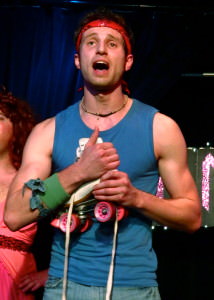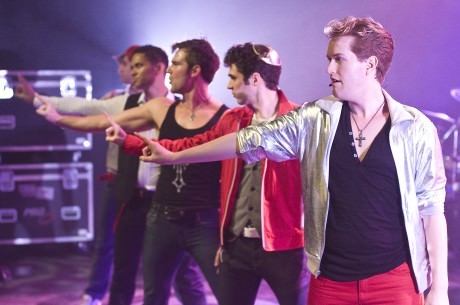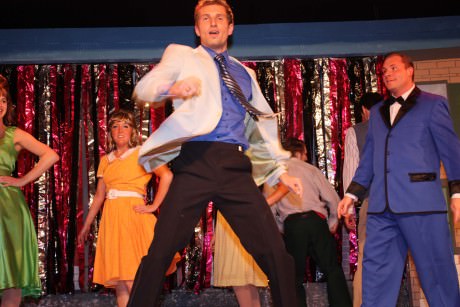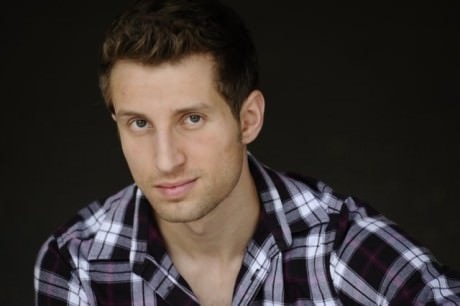Derek John Tatum has been performing professionally for 10 years. Although he got his start in the DC theatre scene, he spent several years auditioning and living in NYC, performing in regional theatre across the country, and working at sea. Here, Derek discusses his experiences and challenges working and living in The Big Apple, in the DC area, and life as an actor, dancer, and singer.
Eric: You have previously mentioned that your ideal assignment would be playing the role of Pippin and its relevance in your personal search in finding your “corner of the sky.” What did you mean?

Pippin is one of my favorite musicals. It has an incredible score and fantastic dance numbers, but the most important part is the actual message it gives. The theme of the musical focuses on a young man who searches for his purpose in life which he calls his “corner of the sky”. Pippin speaks to many of us as we search for our true purpose in life. The concept of “glory” in the musical is refereed to as the ultimate goal that one can reach. I think “glory” for each of us is very different and also changes throughout life. It is important to revisit certain goals throughout your life because they may change as you grow and learn more about the bigger picture. I consider myself to be a true example of Pippin. I have been performing professionally for about ten years now and have learned a lot about myself and life along the way. While I love being on the stage to entertain others, I really don’t enjoy the instability that goes along with it.
In the previous interview with DCMetroTheatreArts during my show, A Chorus Line, I explained that being an actor is like being a juggler because you have to be fully flexible in your schedule so you can audition, rehearse, and attend tech. While I would love to be on Broadway or in LA doing movies, I realize that, at the end of the day, I want a home, family, and stability. DC is a wonderful place to do that because you can live and work as an actor in the same area. Pippin comes to the conclusion that he does not want “glory” because he realizes “If I’m never tied to anything then I’ll never be free,” These words are so powerful and true to me. This basically means that if you constantly float throughout life without direction, there is no anchor to actually ground yourself to free up your mind to know what you truly desire. Pippin chooses to stay with his love, Catherine, after searching for something he isn’t sure of and says, “ I feel trapped, but happy.” Although this statement can be viewed as sad and depressing, I view it in a good way. Like Pippin, I have been on a wonderful journey outside the DC area and have no regrets. However, now it is time to stop traveling so much and start putting more roots down because, ultimately, friends, family and love are the most important things to me. My move from NYC to DC was exactly for this reason. I realize that in this city I still have the outlet to perform and still have my loved ones right in my backyard instead of being halfway across the country. Should a traveling opportunity present itself in the future, I will still consider it. I just want to stabilize my home base first.
Share with us some of the plays and roles you have performed on DC area stages.
I started at Toby’s Dinner Theatre as a swing during college and then got into several shows there including Thoroughly Modern Millie, Kiss Me Kate, George M, High School Musical, Damn Yankees, Chicago, and Smokey Joe’s Café. After a stint in NYC and out to sea on Carnival Cruise Lines, I returned to the DC area to perform as Sonny in Xanadu with Landless, Luke in Altar Boyz with 1st Stage, Link in Hairspray with Way Off Broadway Dinner Theatre, Dr. Dolittle with Imagination Stage, and Don in A Chorus Line at Olney Theatre Company. I also had the privilege of performing on stage with Chita Rivera and Rita Moreno at The Kennedy Center for the Latino Inaugural Celebration.
What was your goal in moving to New York City, and did you achieve it? What were some of the positive experiences living in NYC as well as the disappointments?
I wanted to go to NYC because it is the hub for all performing jobs. It is important not to fear anything in life, and I wanted to see how far I could take my career without any regrets. I wanted to work in as many regional theatres as possible, maybe do a cruise ship, and possibly go to Broadway. I accomplished two out of the three, and although Broadway would be great, I also appreciate the experiences I have had throughout my 20’s. Not many people in a 9-5 job can say that they got to work across the United States and at sea doing what they love and getting paid for it. NYC offered me the chance to really expand my wings and find out more about who I was as a person and a performer. It was easy access to many auditions per day, and the city also offered me a chance to work at really interesting events as a bartender, caterer, and other random projects.
One project that was fun was working with a comedian who was producing a TV show spoofing West Side Story. We filmed in several locations of NYC including the subway, central park, and SoHo, and we were in character the entire time doing choreography and funny improv sayings from West Side Story. It was fun watching people react to us. While NYC can be exciting, it is also a tough city to live in. It is expensive, cold during the winter months, has gigantic roaches, and the audition grind can be rather exhausting. The main disappointments are the auditions that you don’t book. I would say my worst disappointment was when I made it down to 7 guys for one replacement slot in the Mamma Mia National tour and didn’t book it. You have to have a tough skin to do what we do because it usually is 30 “No’s” to one “Yes”. That varies of course, but it is a harsh reality any performer has to accept. Sometimes it is not about talent, but about your type, height, hair color, or something else that is totally out of your control
Does the actor’s audition process differ between New York and DC?
NYC and DC are two completely different cities, yet the talent in both is incredible. NYC is the hub for the performing arts, but DC is now the second largest city for theatre. An actor can attend three to four auditions a day in New York. Once you are done with your audition day, you need to work at night in a survival job whether it is serving, bartending, temping, catering, or selling comedy tickets in Times Square (worst job I ever did!). NYC is also extremely expensive to live in so a lot of actors make the mistake of getting lost in their survival jobs and never go to auditions. During my time in NYC, I made sure to get jobs that would allow me flexibility. I mostly bartended for Broadway Theatres and restaurants, and catered as well.
Now let’s take a look at DC Theatre. There are not nearly as many auditions on a daily basis in DC which is why it is so important to nail each audition as it comes up. Believe it or not, I get more nervous auditioning in DC than in NYC. There is more pressure to do well since the auditions are so few and far between and because most theaters will cast up to a year in advance for their seasons. When I was in NYC I got used to walking in and out of auditions and not overthinking anything. A common saying is, “Do your best and forget the rest”. DC has big equity theatres and smaller professional companies. This is great because you can actually have a more stable life in DC as an actor. Once you are in the circuit, you can work more consistently without traveling as much to get work. Unless you are on Broadway or Off Broadway in NYC, you are usually cast in regional shows that can be in any state (most likely not New York).
DC provides enough theatre opportunities for both full time professional actors and 9-5 people who just wish to pursue it on the side. Each city has it’s benefits for the actor, and it all depends on what you want. NYC offers more auditions and higher paying jobs, but DC offers a familiar theatre community with more consistent work in the same area. I definitely enjoyed my time in NYC, but am very happy to return to the welcoming theatre community of DC. The talent and quality of work here is exceptional and the actors, directors, and designers are always a joy to work with.
Take us into your last New York City audition. Did you get the role?
The last memorable audition I had in NYC was for Smokey Joe’s Café at The Fireside Theatre in Wisconsin. Although I am EMC (Equity Membership Candidate) and working toward my card, I had to sign up on the non-equity list since I am not part of equity and I was auditioning for an equity theatre. At an equity call equity members are seen first, then EMC, then non-equity. I attended the open call for non-equity performers. I was number 100 and it was unclear if they would get to my number that day. I had a callback for the Mamma Mia tour at another location, but by the time I returned from my audition to the Smokey Joe’s call, they had passed my number. I explained to the monitor running the audition that I had already given my headshot/resume to them and was on the list. She told me that the director was done for the day and apologized. Disappointed, I left to go to another audition two metro stops away.

After I arrived at the next audition, I received an email from the casting intern stating that the director would like to see me if I was still in the building. When I explained that I had already left the audition, the intern apologized and invited me to a callback at the end of the week. I am sure it helped that I highlighted on my resume that I had already played the role at Toby’s Dinner Theatre. I ended up booking the job and had a wonderful time playing the role of Michael in Smokey Joe’s in Wisconsin this summer. This was a theatre where I had always wanted to work, and the chance to play a lead role (all parts are leads) was so exciting. It is always interesting to hear different success stories of performers, and I definitely feel like someone above was watching out for me.
How does NYC view DC’s acting community?
From what I hear at auditions, DC is a very well respected theatre community. A lot of actors in NYC get tired of the grind and yearn for a more stable life. DC often comes up in those conversations because you can work as an actor in DC but also have somewhat of a stable life to raise a family. Granted you can do that in NYC too, but it is a very different lifestyle. Many DC theatres also do work with the hope of moving the show to Broadway. The Kennedy Center, Signature Theatre, and Arena are examples of some theatres in this area that have had successful transitions to Broadway. Some actors view DC as a stepping stone before transitioning to NYC because DC can offer excellent credits to boost one’s resume. However, some actors also choose to remain in DC and just work the circuit. Both cities are not far from each other, and I feel that both cities really complement one another in terms of the arts. There is a strong connection between both cities, and most NYC casting directors recognize and respect many DC theaters, especially the big equity houses in the DC area.
What new skills did you learn when you were in NYC, and will they help you when you are looking for new work? Why is it important for young actors to move to New York and have that experience?
NYC has taught me many things so this is a hard question to answer. I would say the main skill set I have gained is true confidence. Living on your own in one of the biggest cities feels like a great accomplishment. It is very scary at first to move to a brand new city, but gradually everything falls into place as long as you keep a positive attitude. I learned so much about the actual business of performing and of course strengthened my own artistic abilities through various classes and workshops.
I also got better at auditioning because I would usually go to at least three auditions per day. Practice makes perfect! I wouldn’t say that you HAVE to go to NYC to become a polished actor. Many actors never go to NYC and are fine actors. However, NYC is the hub of theatre and, therefore, it is a really nice chance to experience the history, culture, and reality of this business. It is definitely a great learning experience that I recommend for any actor. You don’t want to have any regrets, and NYC allows you to see how far you can take your craft whether you make it big or at least get some great credits on your resume. They say in NYC “If you can make it here, you can make it anywhere”. I truly believe this and I am bringing this new confidence and experience back with me to my home area.

What are the advantages of both living and working in theatre in the DC area?
DC is now the second largest city for theatre. There used to only be a few big equity houses in the area, but now there are tons of new theatres popping up that offer both equity and non-equity work. For smaller houses the SPT (Small Professional Theatre) equity contract has allowed a lot of new companies to emerge.( I learned about this information from an interesting seminar I took through the Actors Center which explained whether one should join Equity in the DC area.) In general actors have to travel to where the work is located in order to have a constant pay check. In NYC, this happens mostly by traveling across country like a gypsy to various regional theatres, tours, cruise ships, etc. Here in DC, you can remain employed once your foot is in the door because there are so many theaters that can keep hiring you on a regular basis. DC also offers a very nice geographical area because you are close to the city life of DC and Baltimore, the mountains, the beaches, and you are only a four hour bus ride to NYC if you want to go and audition. I would still like to point out that although DC offers stable work, an actor will still most likely need a second job to actually pay the bills.
You mentioned in your last interview with us that as an actor you are really a ‘ juggler.’ What did you mean by that?
Being an actor IS constantly juggling various projects, but still being able to pay your bills. Most non-union contracts pay very little and even if you are equity and getting a higher pay check, most actors still need some other sort of income. Therefore, the conundrum is finding a flexible survival job that provides you with enough hours to pay the bills, but offers enough flexibility for auditions, tech, and performances. Most performers choose flexible jobs such as freelancing, teaching, catering, bartending, serving, temping, or working in a box office. My survival job in the DC area has been substitute teaching, and in NYC I was a bartender. Recently, I was able to have some stable income as a long-term substitute teacher teaching computer science to middle schoolers. I have also held long-term sub assignments teaching biology at the high school and middle school level. I would like more of a 9-5 job with benefits if I could find an employer who understood my schedule. Unfortunately, this is very hard to find. Some bosses are flexible and are supportive of the actor schedule, but others would not understand why you need to take off 3 weeks for rehearsal and tech.
Take us through your process of obtaining your Equity card. Why is this so important to get that card?
There are three ways an actor can become equity. First of all you can either be offered your card by a producer who feels you are right for the show and hires you as equity on the spot. Secondly you can earn points through the Equity Membership Candidate (EMC) program in which an actor needs to accumulate 50 weeks of performance at an equity house participating in the program. Once they complete the 50 weeks they are able to join equity. This allows the actors to gain valuable experience as an actor at equity houses until they are really ready to commit to joining the union. However, most actors don’t need to complete the 50 weeks because usually a producer will end up giving the card to them before they reach the full amount. The final way you can get into equity is to buy your way in if you are already a member of one of the other unions like SAG or AFTRA.
The union is important to an actor in terms of protection, benefits, and higher pay. Does an actor need to be equity to be successful? I think that really depends on how you define “successful”. Although the union is there to protect actors and offers a higher standard of living, it can also make it harder to get jobs because a lot of producers don’t want to pay the higher equity salary when they can just as easily hire a non-equity actor. Some actors make the mistake of joining equity right after college and then have a tough time competing against other equity actors who have more experience on their resumes. Many actors say they just want to stay non-equity because there are usually more jobs available. If you are doing theatre on the side for fun, it’s probably best to stay non-equity, but if you can secure regular work at equity theaters I think it may be better to join equity so you can depend on a higher salary and benefits such as the health insurance.

You have been given a role in the ensemble of The Producers opening at Olney Theatre during 2015? Take us into your audition. How long did it take before you were offered the role?
Shortly after I returned to the DC area, I was pleased to be invited to audition for the role of Leo in The Producers. The first day I read for the role and also sang. I was then asked to attend a dance call the following day followed by a final callback the day after. It was only a three day process, but it felt longer because of the anticipation leading up to final callbacks. I was happy to have made it to the end of the call, and the creative team seemed very friendly and pleased. Several weeks went by and I had not heard anything, but soon after Christmas I got a call and was offered a contract. When I heard the news I was elated. I am very happy to have the opportunity to return to Olney to be a part of another fantastic summer show. Olney is doing wonderful productions and the creative teams are always on point. They received several Helen Hayes Award nominations this year, and A Chorus Line won the HHA Outstanding Resident Musical last year. I am really looking forward to returning to the Olney family this summer!
You played the role of Michael in Smokey Joe’s Cafe in a Wisconsin Theater for eight weeks. What was it like playing a role like this for an extended time ‘on the road’? What are your favorite Leiber and Stroller songs?
I love Smokey Joe’s Café, and this was my second time playing the role. I first played this role at Toby’s Dinner Theatre in Baltimore which was directed by Kevin McAllister. The Fireside Theatre in Wisconsin was a wonderful experience and I had a great cast. The audiences were really appreciative of the music, and many of the audience members came up to me after the show and said that it brought back so many memories of their childhood. This was very touching to me and reminded me of why I love performing so much. As performers we get to touch the lives of our audience members in some way and hopefully affect them during our performance.
Although it can become draining traveling to do various shows, I think it is important to remember that we are sharing our gifts with others. Unfortunately, many performers sometimes lose sight of this as they struggle to manage their own careers and support themselves.
Smokey Joe’s is a revue of music from the 50s and 60s. When I was not singing with the African American quartet, I sang the lead in songs by artists such as Dion and Elvis. My two favorite Leiber and Stroller songs are “Ruby Baby” and “On Broadway.” I was happy to be out in Wisconsin during the summer, but I would not want to be there in the winter. I felt like I landed in OZ when I got to Wisconsin as I have never seen so much green in my life. It was definitely the country for me, but it was nice to experience another part of the United States that I had not seen. My cast and I enjoyed camping, going to the Wisconsin State fair, seeing drive in movies, splashing in the Wisconsin Dells, and eating a lot of cheese.
What’s your opinion about the quality of theatre in the DC area?
As I said before, I think DC has a fantastic theatre community. It is filled with very creative minds and impressive talent. There are all kinds of levels of theatre for an actor to pursue from equity houses to non-equity houses to community theatre. All levels of theater here are very impressive! I am proud to be from the DC metro area and very happy to have returned.
Has the DC theater community changed over the years since you started working in it?
From what I have heard from older actors, the DC area has evolved tremendously since I was born. There used to only be a few big equity theaters in the area and most of them cast their performers from auditions in NYC. In the 80’s, dinner theaters were very popular and abundant in the DC area and provided actors with many performing opportunities. Now, unfortunately, just a few like Toby’s Dinner Theatre still stand. I actually got my start at Toby’s as a swing during college. Since I entered into the business in 2005, I have noticed even more and more theatre companies popping up. It is not just the SPT equity contracts that are the cause of this, but it seems that more and more actors are starting their own companies. I highly admire these actors who have taken the leap to create their own companies which help expand our theatre market.

If you could have 5 performers or theatre people to your house for dinner (living or passed on), who would you invite and why?
Well, this is a HARD question!! My first would have to be Michael Jackson because, although there was a lot of hype about him in the news, I think he was truly an amazing artist who not only commanded the stage, but really reached out to people in need. His music is so moving and I, unlike some artists, I believe that he really cared about humanity and reached so many through his songs. I would also have to invite Lucille Ball. We actually share the same birthday (August 6th) and I think she was a brilliant performer who really captured her audiences and could make anyone laugh. The next would have to be Ben Vereen. No one can touch his dancing and, of course, he starred in my favorite musical Pippin. I actually met him after a performance of Pippin on Broadway and got my picture taken with him. I was awed by his presence and down to earth personality. Bob Fosse would be invited for his brilliant style of choreography and the contribution of his art to so many shows that I love. Last, but not least, Fred Astaire for his dapper style and amazing tap dancing.
LINKS
‘They’re the Altar Boyz’ Part Four: Meet Derek Tatum by Joel Markowitz.
Derek Tatum on Playing Don Kerr in Olney Theatre Center’s ‘A Chorus Line’ by Eric Denver and Joel Markowitz.




